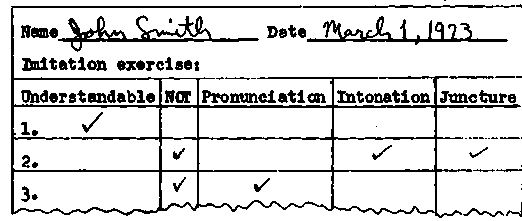Chapter 3. Sample evaluation
(coded to course objectives)
- L-1
You will hear ten Russian words. In the pause after each word, indicate whether the "Л" sound in the word is soft or hard. Use the letter S for soft; G for hard.
1. пошли 6. баскетбол 2. отлично 7. болен 3. делать 8. журнал 4. плохо 9. пластинки 5. фильм 10. телефон - L-2
Repeat the following sentences after the model. The teacher will evaluate each sentence to be either understandable or not understandable (to a native speaker). If not understandable, the teacher will mark the proper column to indicate a specific problem.

Sample grading sheet: (may be dittoed)
Examples of sentence or dialog models:
Андрей? здравствуй!
Слушаю радио. Хороший джаз.
ты читаешь журнал?
он умеет играть в футбол?
Они только начинают играть.
- L-3
You will hear a series of statements. After each one the speaker will make two further statements — A and B. Only one of these naturally continues the thought of the first statement. You are to decide which one it is. Indicate the correct answer by marking either A or B on your answer sheet.
игроки уже на поле.
Они бросают мяч.
они идут в парк.
я дома.
я играю в баскетбол.
я слушаю радио.
Я смотрю телевизор.
сегодня хороший фильм.
я как раз спрашиваю.
он опять спрашивает.
Почему ты не отвечаешь?
почему ты не берёшь?
он редко играет в футбол.
он здоров.
он очень занят.
- S-1a
Repeat the following list of words exactly as you hear them. The teacher will mark either U (understandable) or NU (not understandable) on your paper, You must have seven of the ten marked with a U to complete the exercise successfully.
1. учитель 6. плохо 2. Коля 7. Футбол 3. отлично 8. слушать 4. болен 9. журнал 5. отлично 10. пластинки - S-1b
The same instructions apply to this list of words as apply to that in exercise "S-1a" .
1. хлеб 6. свитер 2. готов 7. редко 3. диалог 8. сделать 4. джаз 9. блузка 5. лимонад 10. книжка - S-2
Answer the following oral questions orally:
Он хорошо играет в карты?
кто хорошо играет в баскетбол?
вы каждый день слушаете радио?
вы иногда слушаете пластинки?
вы умеете играть в шахматы?
- Oral exercises
- S-3a
Я играю в мяч. Я играю в мяч.
ты -------- Ты играешь в мяч.
Он -------- Он играет в мяч.
Мы -------- . и т. д.
вы -------- .
Они -------- .
- S-3b
Зонтик не нужен. зонтик не нужен.
Свитер -------- . свитер не нужен.
Куртка -------- . Куртка не нужна.
пальто -------- . и т. д.
спички -------- .
одеяло -------- .
- S-3c
сумка здесь? Да она здесь.
печенье там? Да оно там.
Пирожки здесь? и т. д.
лимонад внизу?
хлеб там?
варенье тут?
- S-3d
(сумка) (твой) это твоя сумка.
(свитер) (мой) Это мой свитер.
(книги)(чей) чьи это книги?
(парта) (чей) и т. д.
(радио) (её)
(радио) (наш)
- R-1a
Read the following words to your teacher, being careful to pronounce them correctly.
1.
джаз
6.
плащ
2.
ждёт
7.
ваш
3.
лишний
8.
кошелёк
4.
мешок
9.
почему
5.
вещи
10.
чай
- R-1b
Read the following list to your teacher. Remember the paired counterpart consonants.
1. автомобиль 7. всегда 2. свитер 8. отзвук 3. завтра 9. водка 4. близко 10. отвечать 5. книжка 11. редко 6. твой 12. сделать - R-2
Read the following dialog. Demonstrate comprehension by correctly answering the multiple choice answers which follow the selection:
Серёжа — Тамара! куда ты идёшь?
Тамара — Домой.
Серёжа — домой? Ты не знаешь что сегодня матч?
Тамара — нет! Но я больна. до свидания.
1. кто идёт домой? 2. Когда матч? A. Серёжа B. Сегодня B. Тамара B. Завтра - R-3
Read the following to your teacher with meaningful pronunciation, intonation and juncture:
А. Брат не идёт в поход.
В. почему?
А. Он болен.
- W-1
Copy the following in Cyrillic script. Strive for perfection:
Андрей и Борис не идут в поход.
Почему?
Они больны!
- W-2
Write the following dictation paying attention to spelling and punctuation:
Твои родители хорошо читают по-русски.
Что ты делаешь завтра?
- M-1
Make three statements which compare life as you live
it and life in the dialogs from units 4 and 5.
- M-2
List as many reasons as possible for studying Russian
culture and the Russian language.
- M-3
Compare the Russian language to the English language using things you have learned in this course as points of comparison.